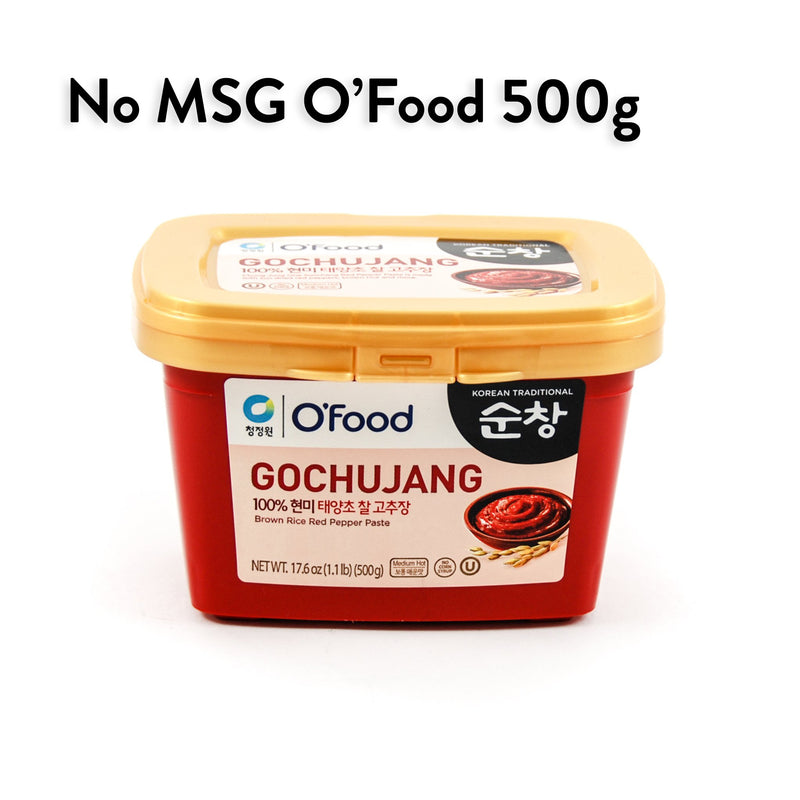Gochujang Hot Pepper Paste
Description
Gochujang red pepper paste is a traditional Korean condiment used to bring rich spiciness to soups and jjigae stews, or add a bit of excitement to a bowl of plain rice. The deep red gochujang paste has kimchi-like taste and complex chilli flavours. It's perfect for enhancing traditional Korean dishes and stir fries, but gochujang is also exciting when used in unexpected recipes – such as bacon butties and chilli kale chips!
What is gochujang?
Gochujang literally means chilli bean paste. It's also known as hot bean paste, red chilli paste and Korean chilli paste. Gochujang is one of the cornerstones of Korean cuisine. It's distinctive flavour doesn't really have a substitute, so we always keep plenty in stock.
How can I use gochujang?
Try mixing the gochujang with doenjang (fermented soybean paste), minced spring onions, garlic, ginger, rice wine and sesame oil to make ssamjang - the dipping sauce for Korean lettuce wraps. Also use gochujang in a marinade for bulgogi beef, and as a dressing for the Korean raw fish and vegetable dish, hweh bop bop. Read our guide to gochujang to learn more. Check out Bibimbap's recipe here too!
Gochujang O'Food No MSG - 500g: tapioca syrup, water, brown rice, red pepper powder, salt, alcohol (to preserve freshness), soybean, garlic, onion.
Gochujang Classic - 1kg & 3kg: Red pepper mixed seasoning (red pepper powder, water, salt, garlic, onion), corn syrup, brown rice, water, fermented soybean paste (soybean, salt) salt, isomaltooligosaccharide, alcohol (to preserve freshness), red pepper powder, sweet brown rice flour, yeast extract powder (flavour enhancer E621, yeast extract, dextrin). May contain wheat.
Haechandle - 500g & 3kg: corn syrup, red pepper seasoning 23.8% (red pepper powder, water, salt, onion, garlic), water, wheat flour, wheat, defatted soybean powder, salt, alcohol (contains barley), soybean, soybean powder, glutionous rice, koji.
Allergy Advice: for allergens see ingredients in bold.
Storage: store in a cool, dry place. Once opened, keep refrigerated.
-
Origin: South Korea
-
Size: from 500g
-
Best before: 24 March 25
-
SKU: BB0026K
-
Minimum shelf life: 3 months
-
Categories:
Asian Sauces & Condiments Asian Store-Cupboard Staples BBQ Ingredients Bestsellers Chef Top Picks Chilli & Hot Sauce Foodservice Gochujang Harissa & Chilli Paste Korean Food & Ingredients Sauces & Condiments Spring Tableware Tim Anderson's Top Picks Vegan Cooking Sauces & Condiments Vegan Food & Ingredients
Product Highlights
- Traditional Korean condiment
- Spicy, fermented chilli bean paste
- Serve with plain rice, soups & jjigae stews
- Use to make ssamjang - Korean dipping sauce
- Key ingredient in bibimbap
Delivery
| Delivery Option | Price |
|---|---|
| EVRi ? | £4.50 or FREE for orders over £60 |
| DPD Express ? | £7 or FREE for orders over £100 |
| DPD Signature Required ? | £7 or FREE for orders over £60 |
| DPD Saturday or Sunday ? | £9 or FREE for orders over £150 |
Disclaimer
These summary details have been prepared for information purposes only, and are designed to enhance your shopping experience on the Sous Chef website. While we have taken care in preparing this summary and believe it is accurate, it is not a substitute for your reading the product packaging and label prior to use. You should note that products and their ingredients are subject to change.
FAQs
Is gochujang spicy?
With hot-spicy-umami flavours, gochujang is a potent addition to stews, soups and marinades – you only need a little to provide a punchy flavour. While this paste is spicy, it is balanced with a deep savouriness.
Is red pepper paste the same as gochujang?
Gochujang is a Korean variety of red pepper paste. There are many different varieties of red pepper paste used across the world including harissa and sambal, however the prominent ingredients in gochujang are soybeans and sticky rice.
How can I use gochujang?
Gochujang is a key ingredient in jjigae stews and bokkeumbap – kimchi fried rice. You can also use gochujang in a marinade for bulgogi beef, and as a dressing for the Korean raw fish and vegetable dish, hweh bop bop. Alternatively, mix the Korean red pepper paste with ginger and lime for zingy salad dressing or use as a marinade for chicken stews.



















